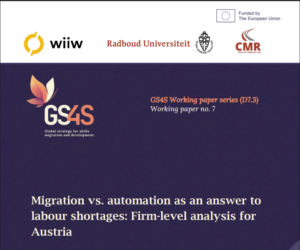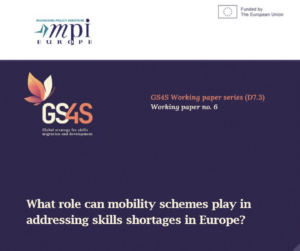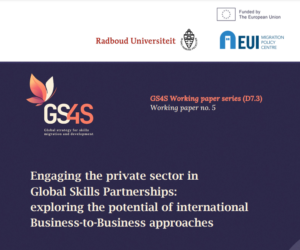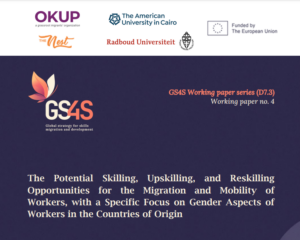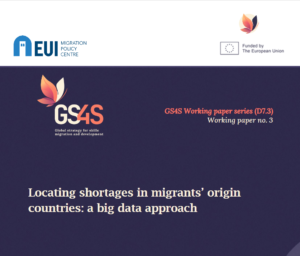WORKING PAPER SERIES
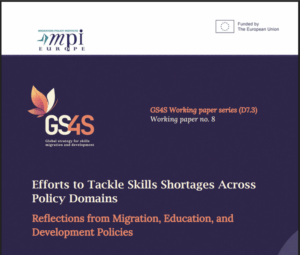
Download Document
Working Paper No. 8:
Efforts to Tackle Skills Shortages Across Policy Domains
23 April 2025 – This working paper examines the complex landscape of policy approaches to addressing skills shortages in Europe, offering a comparative analysis of interventions across migration, education, and development policy domains. Through a detailed exploration of policy responses at both national and European levels, the paper provides a typology of alternatives for mitigating shortages across these policy areas, with a particular focus on the digital, care, and construction sectors. By analysing the diversity of policy responses, the paper identifies emerging trends, challenges, and untapped opportunities to bridge skills gaps in Europe including through enhanced coherence across policy domains.
Download Document
Working Paper No. 7:
Migration vs. Automation as an Answer to Labour Shortages: Firm-Level Analysis for Austria
2 April 2025 – This study empirically examines the relationship between robot
adoption and immigrant labour (differentiated by region of origin and education level) in Austrian
firms using a novel dataset linking firm-level survey data on robotics adoption from Austria’s
Information and Communication Technologies (IKTU1) surveys (waves 2018, 2020 and 2022) with
registry-based employment records. Employing Poisson pseudo-maximum likelihood (PPML)
estimations, we analyse firm-level employment decisions while controlling for firm characteristics, industry and region.
Download Document
Working Paper No. 6:
What Role Can Mobility Schemes Play in Addressing Skills Shortages in Europe?
4 March 2025 – The sixth working paper assesses the recent evolution of mobility schemes and partnerships in the European context, exploring the implications for using these initiatives to address skills shortages. Taking recent academic literature that has focused more on skills development and training as a starting point, this paper generates a typology that reviews mobility schemes based on the skills needs they are trying to address and the type of mobility they seek to support, ranging from short-term visits to long-term training or work placements. Building off this typology, the paper also includes short case studies of recent / ongoing mobility schemes, examining how they approach mobility and skills development and their outcomes to date.
Download Document
Working Paper No. 5:
Engaging the Private Sector in Global Skills Partnerships: Exploring the Potential of International Business-to-Business Approaches
29 January 2025 – The fifth GS4S Working Paper asks how private sector actors in comparable settings are operating in terms of training and attracting workers, and if they are leading or managing structures similar to GSPs with other businesses already. The goal of this exercise is to understand how business-to-business (B2B) partnerships may be designed to function well as a GSP, such that it culminates in beneficial outcomes for all stakeholders: not only the businesses involved but also workers themselves, as well as the countries of origin and destination. As part of this, the paper establishes some important factors and policy levers to keep in mind when designing or regulating a B2B partnership, for audiences ranging from EU policy makers to NGOs, training centres, and businesses considering B2B approaches to GSPs.
Download Document
Working Paper No. 4:
The Potential Skilling, Upskilling, and Reskilling Opportunities for the Migration and Mobility of Workers, with a Specific Focus on Gender Aspects of Workers in the Countries of Origin
Download Document
Working Paper No. 3:
Locating Shortages in Migrants’ Origin Countries: A Big Data Approach
29 January 2025 – The third GS4S Working PAper documents a data collection on vacancies published online, which is being implemented by web scraping online platforms in selected non-EU countries. The data collection aims at locating labour or skill shortages in important origin countries of migration to the EU. Where the shortages coincide with shortages in EU countries, a skill partnership could address both shortages simultaneously. The potential of the web scraped data are explored based on the initial wave of the data collection. The note concludes by outlining how the data collection can be
transformed into measures of shortages at the level of occupations and skills.
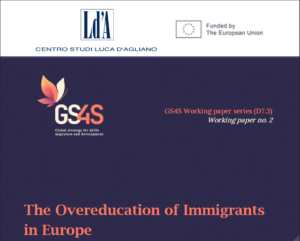
Download Document
Working Paper No. 2:
The Overeducation of Immigrants
in Europe
3 October 2024 – This paper explores the overeducation of tertiary-educated migrants in European labour markets. Using data from the European Labour Force Survey (2012–2022), we show that immigrants, particularly those from non-EU countries, are significantly more likely to be overeducated than natives. Despite a general decline in overeducation levels for all groups over time, the immigrant-native gap remains, especially for foreign-educated migrants. Furthermore, the likelihood of overeducation for foreign-educated migrants increases until 15–19 years after migration, a pattern consistent across all areas of origin and migration cohorts. Importantly, differences in educational quality between origin and destination countries do not primarily account for these overeducation differentials. The findings underscore the need for policies that better align immigrants’ skills with labour market demands in Europe to avoid the waste of valuable immigrants’ skills, which are harmful not only to migrants but to the economies of receiving countries too.
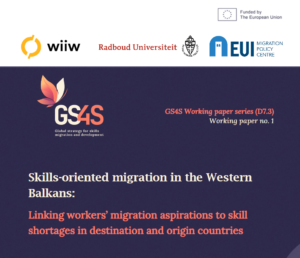
Working Paper No. 1:
Skills-Oriented Migration in the Western Balkans
